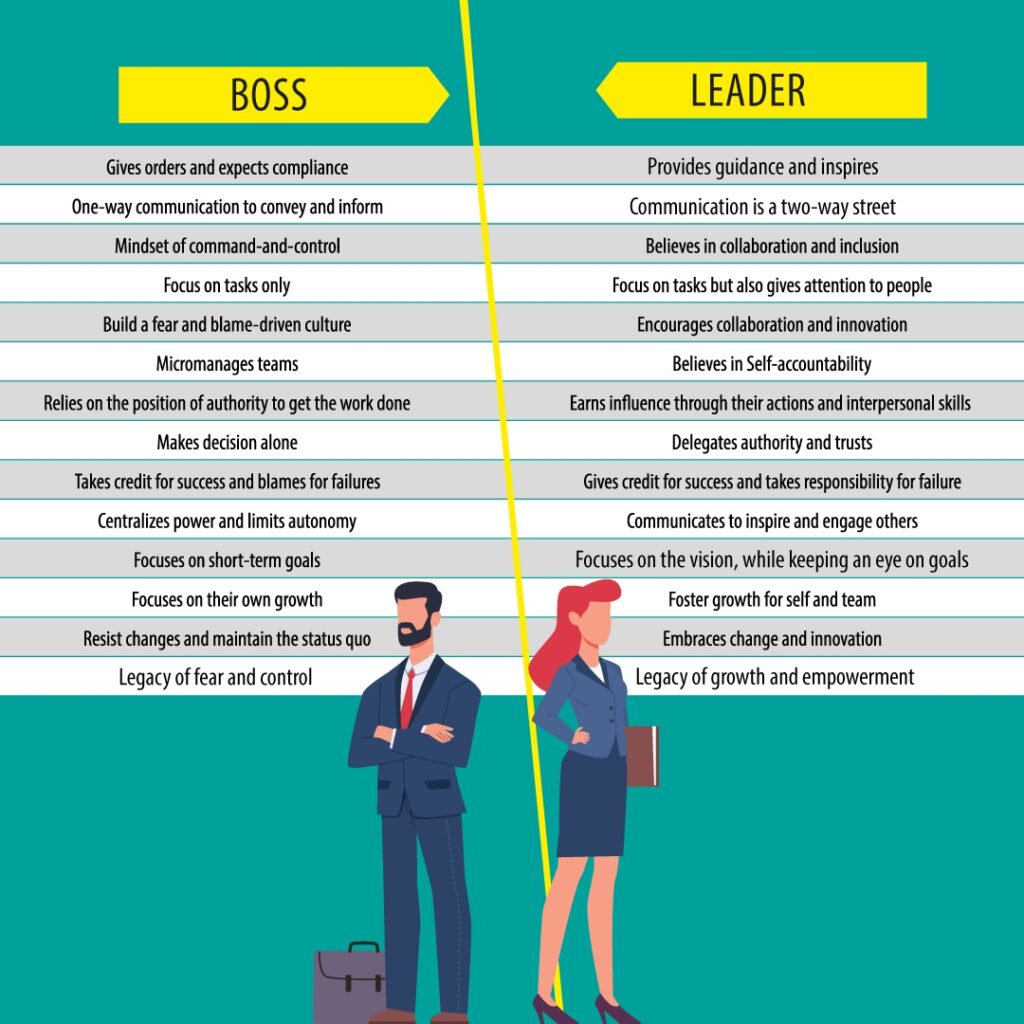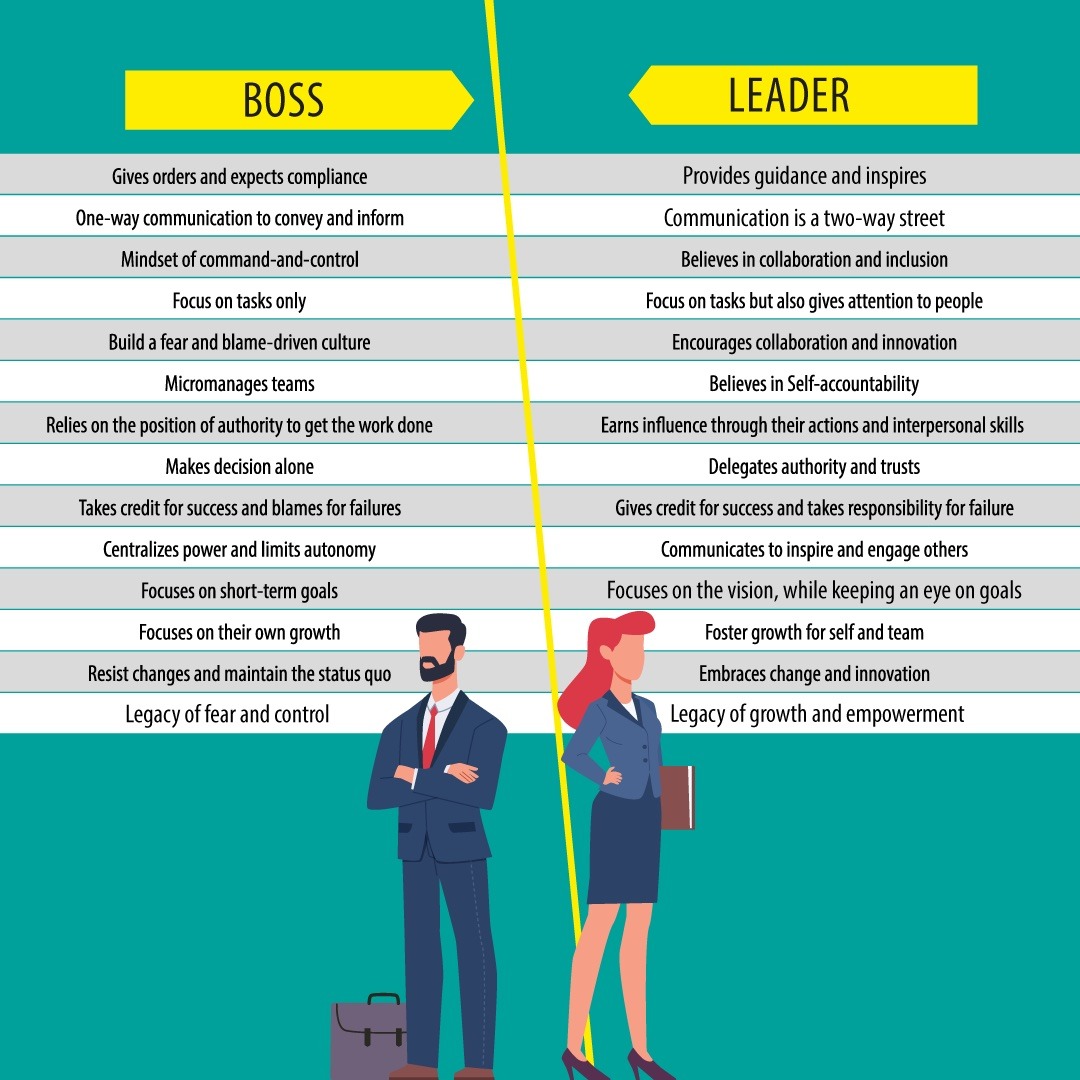Every organization has people in positions of authority to overlook the work of their teams. These bosses or leaders are abundantly responsible for encouraging and uniting the team members toward common business goals.
But while we often use the term “boss” and “leader” interchangeably, they are not the same. Let’s explore the differences and why you’re better off as a leader and not just a boss.
Boss V/S Leader – Key Differentiation

Bosses generally have a dominating approach. They like exercising control over their subordinates and mostly focus on giving orders, directing tasks, and ensuring the work gets done.
A leader, on the other hand, is someone who motivates and inspires. They empower their subordinates, offer guidance, and build an environment fostering collaboration and growth.
Why Be a Leader and Not a Boss?
1. Bosses Engender Poor Workplace Communication
86% of the executives and employees believe lack of effective communication and collaboration is the leading cause of workplace failure.
Bosses generally have a one-way communication style. They dictate instructions and expect their subordinates to follow without question- a perfect recipe to stifle communication.
Leaders embrace two-way communication, actively listening to their team members, encouraging diverse perspectives, and providing constructive feedback.
2. Bosses are Not Empathetic
90% of US workers believe empathetic leadership improves job satisfaction, and 79% agree it decreases employee turnover.
Bosses tend to prioritize task completion above everything else. Their focus is on meeting deadlines, achieving targets, and ensuring work is completed effectively. While these objectives are crucial for any business, the well-being and development of the employees are often neglected in the process.
Leaders are empathetic and focus on striking a balance between task completion and people development. They understand the importance of investing in the team’s growth and recognizing their achievements for improved productivity and long-term success.
3. Bosses Discourage Innovation
80%-90% of business executives agree innovation is a top priority, but only about 6% of them are satisfied with the organization’s performance.
One of the biggest deterrents to innovation and creativity is a culture of fear. Bosses are often seen reacting to mistakes and failures with blame and punishment, creating a fear-driven environment.
Leaders, on the other hand, view failures and mistakes as valuable learning experiences. They encourage people to innovate, take calculated risks, learn from setbacks, and find solutions collectively.
4. Bosses Lead to Higher Turnover
57% of the employees had left at least one job in their career due to a bad boss.
It doesn’t take long for a lot of employees to realize the impact a commanding and controlling boss can have on their mental well-being and overall quality of life. And with the boss not concerned about their growth and development, quitting seems to be a practical option for many.
But the collaborative and inclusive leadership approach where employees are regularly offered opportunities to learn and grow makes people stay at the organization longer. Such employees are also happier, more productive, and less stressed.
5. Bosses are Micromanagers
59% of people have been managed by a micromanager at some point in their career.
Micromanagement is a workplace phenomenon frowned upon globally. As bosses delegate tasks and want them completed on time, they often tend to micromanage their team members.
Unlike bosses, leaders prefer self-accountability and trust their employees to get the job done. Once the task is delegated and a timeline is provided, they let the employees manage their to-do list rather than asking for constant updates or hovering over the process to get things done.
Are You a Boss or a Leader?
While a boss and a leader are tasked with the same objective to manage people and grow business, how they bring about the expected results makes all the difference. By understanding the distinctions between being a boss and being a leader, you can assess your own approach and strive to become a more effective change-maker.
Whether kicking off your boss-to-leader voyage or refining your leadership skills, professional assistance can guide you through shifting your mindset and adopting behaviors that can impact and inspire others.


